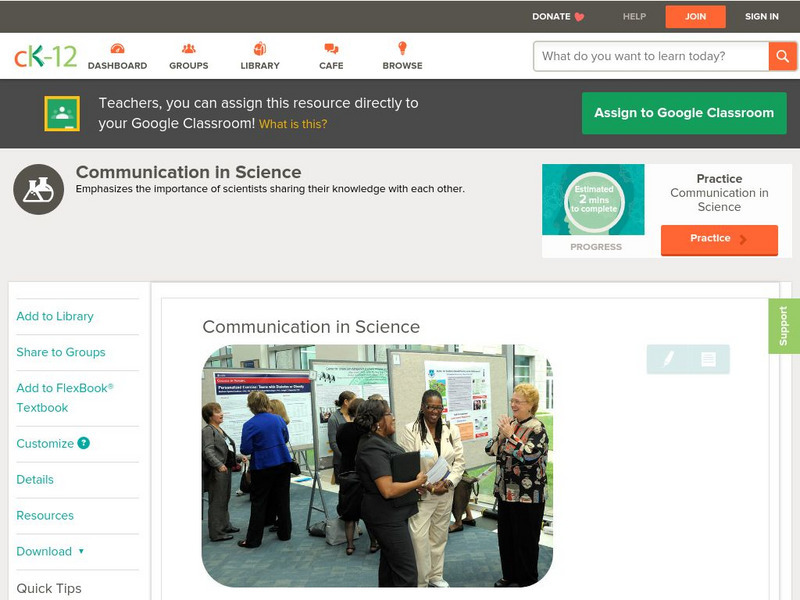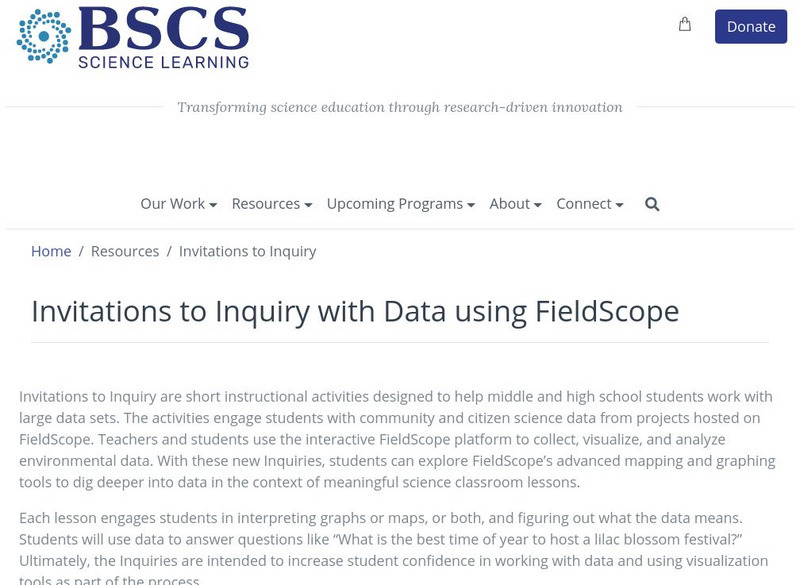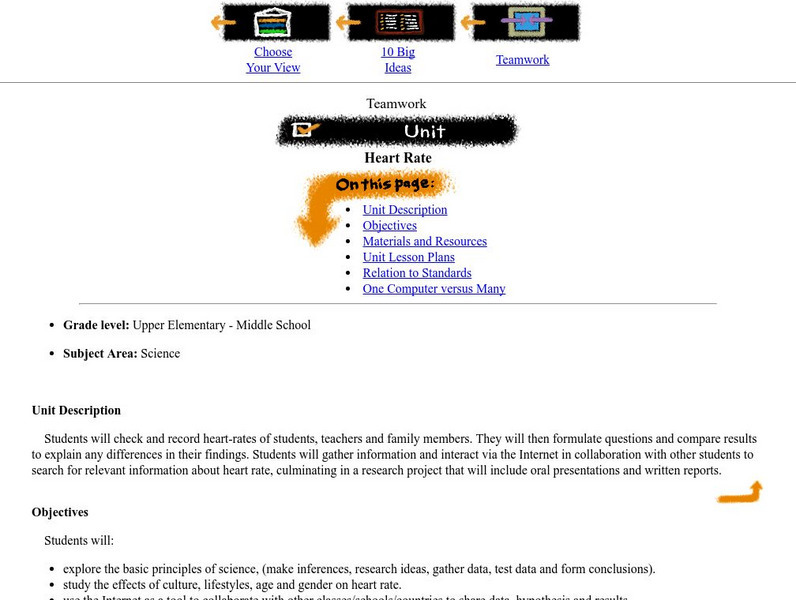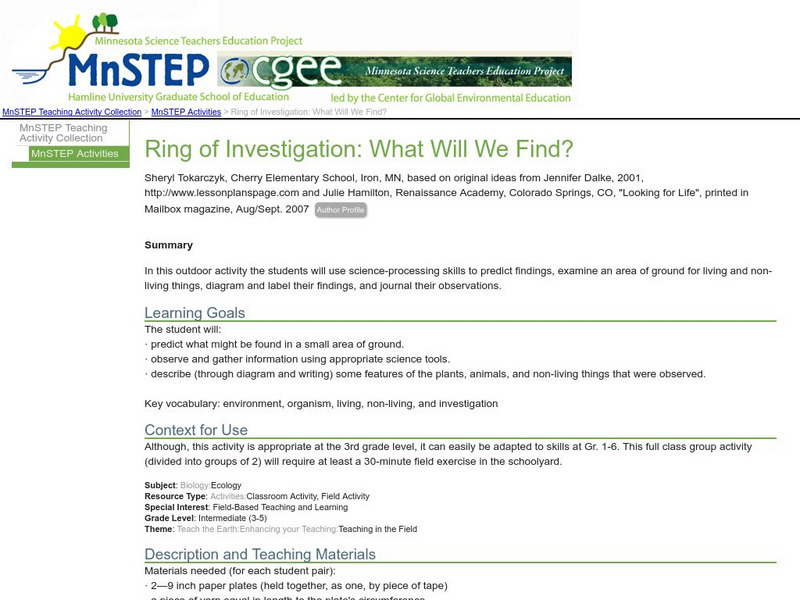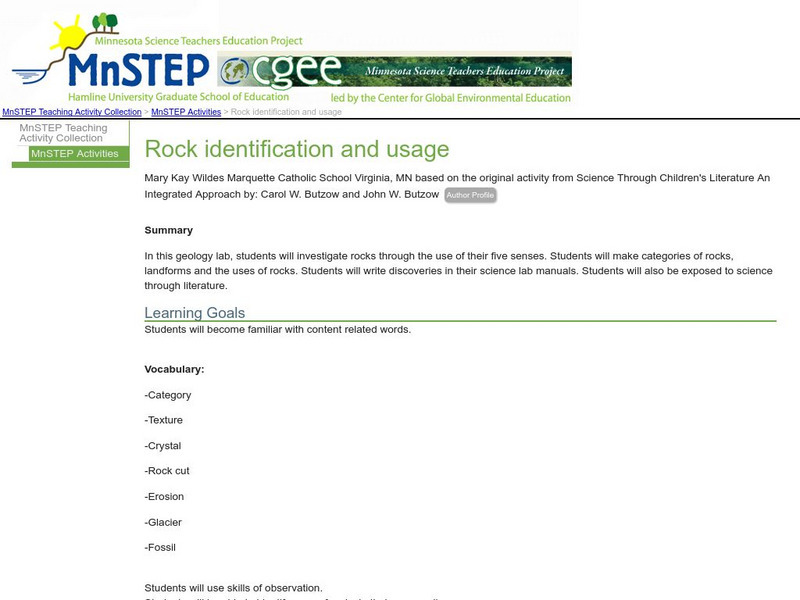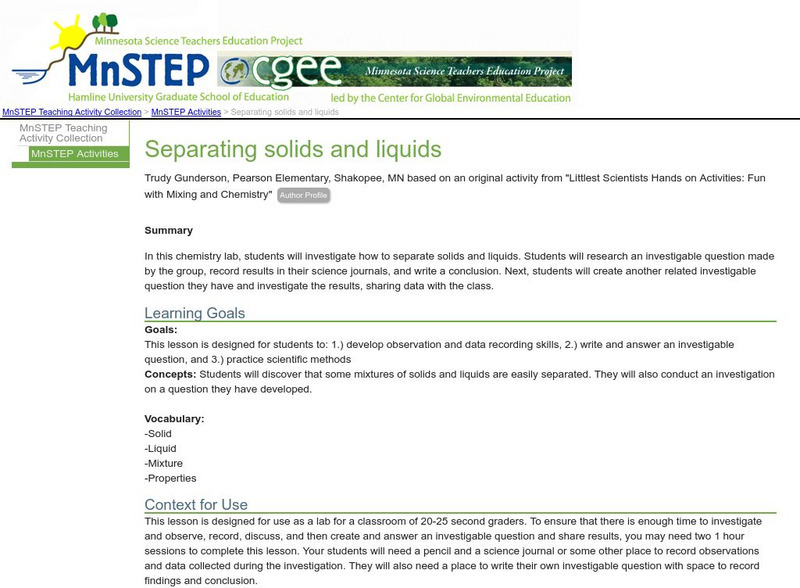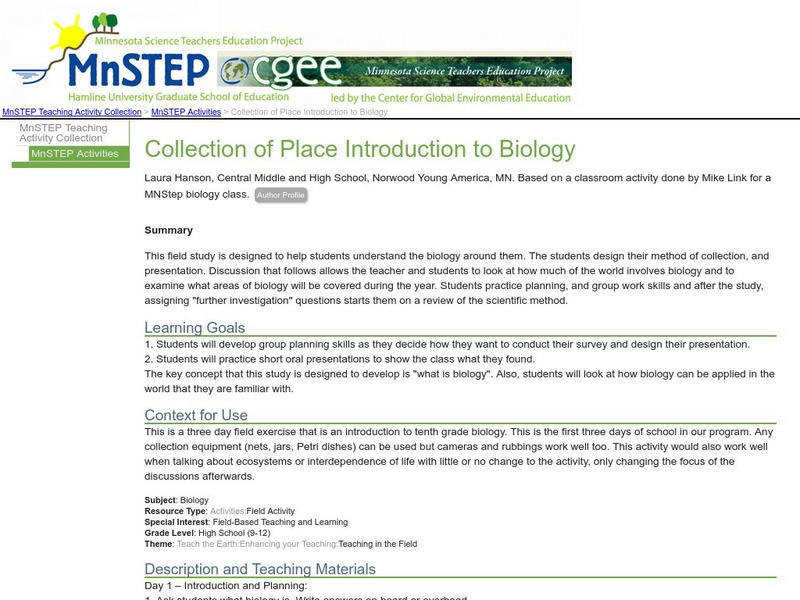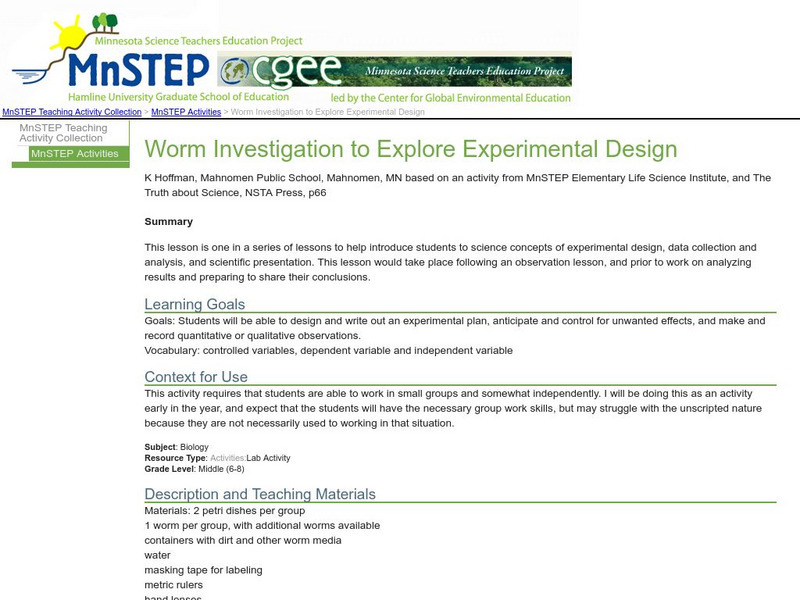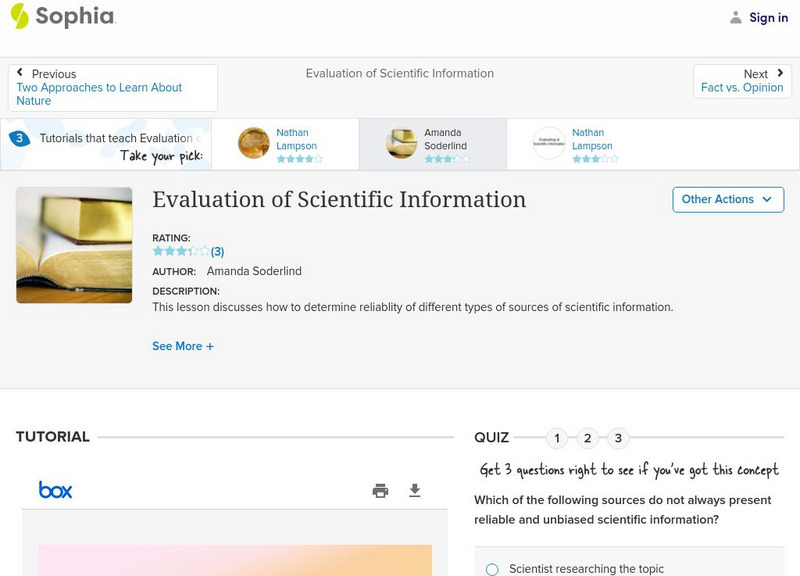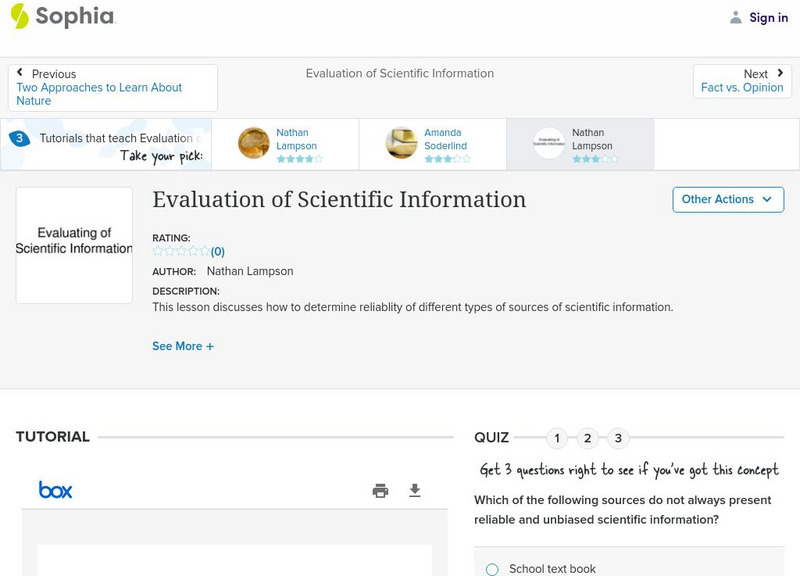CK-12 Foundation
Ck 12: Physical Science: Communication in Science
[Free Registration/Login may be required to access all resource tools.] Explores the importance of communication in science and ways scientists communicate.
CK-12 Foundation
Ck 12: Earth Science: Development of Theories
[Free Registration/Login may be required to access all resource tools.] Examines theories and laws in science.
Alabama Learning Exchange
Alex: The Legend of the Mummy's Curse Fact or Fiction?
This is a technology-based, hands-on Biology lesson used to introduce the scientific method to students. Students will make a prediction on whether they think the curse is true or false. Students will listen to a podcast describing a...
Alabama Learning Exchange
Alex: Mystery Powder Investigation
During this lesson plan, young scholars will work individually to identify a mystery powder. Students will have the opportunity to test known powders with different substances and record observations. Young scholars will develop a plan...
Alabama Learning Exchange
Alex: How Do Magnets Work?
During this lesson students will examine magnets and determine that they have two poles (north and south). They will observe which poles attract and which poles repel.
CK-12 Foundation
Ck 12: Earth Science: Correlation and Causation Study Guide
This comprehensive study guide covers the main terms and concepts needed for an earth science unit on the scientific principles of correlation and causation. Review questions are included at the bottom of the study guide.
Other
Science Museum: Total Darkness
When the power goes out, it's time for action in our brand new game. Venture into the dark, explore different locations and meet new characters - creating your own unique adventure as you play! Use your science skills to get the power...
CK-12 Foundation
Ck 12: Life Science: 1.3 Scientific Method
Explore the process of doing scientific investigations.
CK-12 Foundation
Ck 12: Life Science: 1.5 Basic and Applied Science
Get an overview of applied science where people use and apply information obtained through basic science.
CK-12 Foundation
Ck 12: Life Science: 1.1 Scientific Ways of Thinking
Learn how to think like a scientist.
BSCS Science Learning
Bscs: Invitations to Inquiry With Data Using Field Scope
Invitations to Inquiry are short instructional activities designed to help middle and high school students work with large data sets. Teachers and students use the interactive FieldScope platform to collect, visualize, and analyze...
BSCS Science Learning
Bscs: A Medical Mystery
Students are immersed in an online environment that challenges them to solve the medical mystery: "What's Wrong with M'Kenna?" This resource includes the complete middle school science curriculum unit, a teacher's guide, and an online...
Google
Louisiana Curriculum Hub: Ela Guidebooks: Grade 5: The Making of a Scientist: Unit Files
A Google Drive folder with instructional presentations, discussion questions, student activities, and assessments for the book, The Making of a Scientist.
McREL International
Mc Rel: Whelmer #64 Learning Activity: Liquid Rainbow
An easy to do activity that investigates density and solubility. The activity is presented in lesson plan format that meets NSES standards.
Michigan State University
Michigan State University: Lets Net: Heart Rate
In this experiment, students will compare heart-rates of classmates and family member to draw conclusions about their data. Students can collect data and collaborate with others on the Internet to broaden their sample size. Lesson...
Science Education Resource Center at Carleton College
Serc: Mn Step: What Is in the Pond?
This is a scientific investigation where students establish what macro-invertebrates live in a local water habitat (stream, pond, aquarium), and predict how healthy the water is. They then test the water quality, record the data, and...
Science Education Resource Center at Carleton College
Serc: Mn Step: Ring of Investigation: What Will We Find?
For this science investigation, students will observe and catalog the living and non-living things they find within a small, circumscribed area of the schoolyard.
Science Education Resource Center at Carleton College
Serc: Mn Step: Rock Identification and Usage
In this activity, students explore rocks using their five senses. They sort them into groups, learn about landforms, and learn how rocks are used by humans. Their discoveries are recorded in their science notebooks.
Science Education Resource Center at Carleton College
Serc: Mn Step: Separating Solids and Liquids
An activity designed for second grade, where students explore how to separate various solids and liquids, for example, pepper and water. They then decide on another mixture and compose a new question to investigate. Throughout they are...
Science Education Resource Center at Carleton College
Serc: Collection of Place Introduction to Biology
Students explore how much of the world involves biology and examine what areas of biology will be covered during a course. Students practice planning and group work skills.
Science Education Resource Center at Carleton College
Serc: Mn Step: Worm Investigation to Explore Experimental Design
For this lesson, students learn about how to design an experiment, factor in other potential effects, take observations, and record their findings. The experiment is done using worms in a lab setting.
Sophia Learning
Sophia: Evaluation of Scientific Information: Lesson 2
This lesson discusses how to determine reliablity of different types of sources of scientific information. It is 2 of 3 in the series titled "Evaluation of Scientific Information."
Sophia Learning
Sophia: Evaluation of Scientific Information: Lesson 3
This lesson discusses how to determine reliablity of different types of sources of scientific information. It is 3 of 3 in the series titled "Evaluation of Scientific Information."
Sophia Learning
Sophia: Two Approaches to Learn About Nature: Lesson 3
This lesson illustrates the process by which people can learn about the nature of living things. It is 3 of 3 in the series titled "Two Approaches to Learn About Nature."


